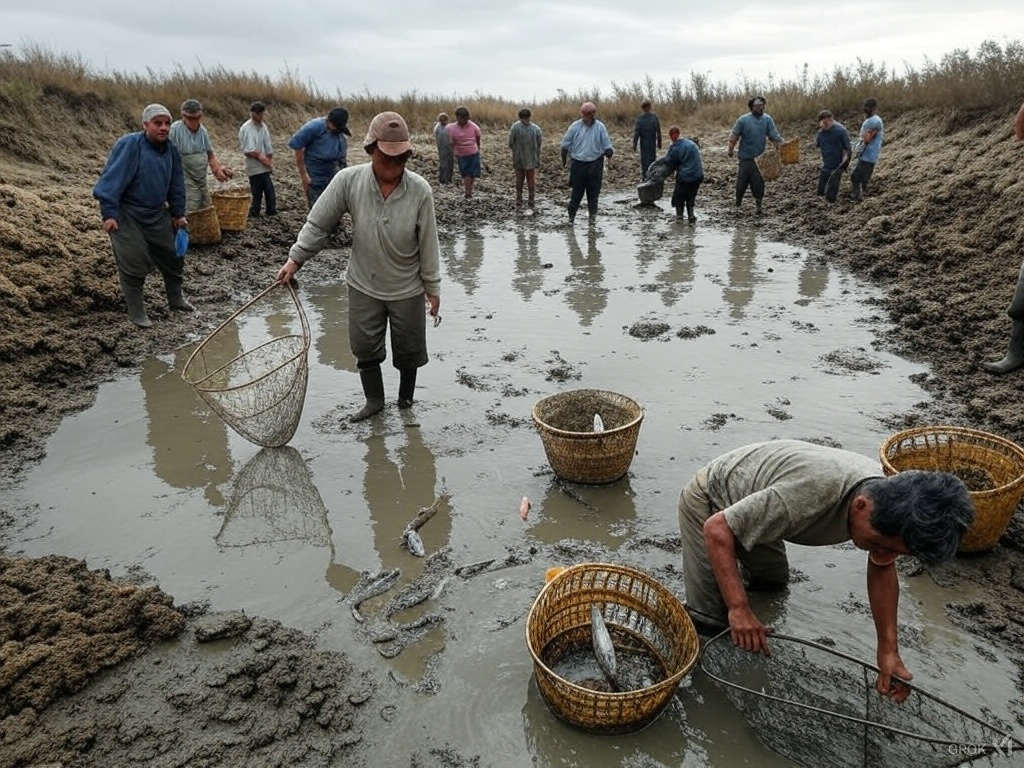"Jié Zé Ér Yú" (竭泽而渔) - Don't Empty the Pond to Catch Fish!

Imagine someone so desperate to catch fish that they drain an entire pond, leaving it barren and lifeless for the future. This drastic, short-sighted act perfectly illustrates the Chinese idiom "Jié Zé Ér Yú" (竭泽而渔). It’s a powerful warning against prioritizing immediate gain at the expense of long-term sustainability. Let's dive into its meaning and learn why it's still so relevant today!
Pronunciation and Breakdown:
- Jié (竭): (Pronounced: jié, Tone 2 - rising tone) - To exhaust, to deplete, to use up completely
- Zé (泽): (Pronounced: zé, Tone 2 - rising tone) - Pond, lake, marsh (body of water)
- Ér (而): (Pronounced: ér, Tone 2 - rising tone) - And, thus, therefore (connecting word)
- Yú (渔): (Pronounced: yú, Tone 2 - rising tone) - To fish, fishing
Putting it together, "Jié Zé Ér Yú" literally means "exhaust the pond to catch fish." It paints a vivid picture of a destructive fishing method that prioritizes immediate catch over the long-term health of the ecosystem.
Origin and Story: A Lesson from Ancient Statesmanship
The idiom "Jié Zé Ér Yú" originates from the ancient Chinese text, Liezi (列子), and is associated with a story about Duke Wen of Jin (晋文公), a prominent ruler during the Spring and Autumn period (around 7th century BC).
The story goes that Duke Wen of Jin wanted to appoint Yong Ji (雍季), a man known for his quick wit and immediate solutions, to an important position. However, another advisor, Xi Xian (郤献), cautioned against this, using the analogy of "Jié Zé Ér Yú."
Xi Xian argued: “If you drain the pond to catch fish, you might get them all at once, but there will be no more fish next year. If you burn the forest to hunt animals, you might get a good hunt this time, but there will be no more animals next season. While Yong Ji’s strategies might offer quick results, they are ultimately short-sighted and unsustainable. True long-term prosperity requires nurturing resources, not depleting them.”
Duke Wen of Jin, recognizing the wisdom in Xi Xian’s words, understood the danger of "Jié Zé Ér Yú" and the importance of sustainable governance.
Meaning and Usage: Short-Sighted Gain, Long-Term Loss
"Jié Zé Ér Yú" (竭泽而渔) means: to exhaust the pond to catch fish; to pursue short-term gain without considering long-term consequences; to sacrifice the future for immediate benefit; to kill the goose that lays the golden eggs.
This idiom serves as a powerful metaphor for unsustainable practices in various aspects of life, from environmental issues to business strategies and personal decisions. It highlights the folly of prioritizing immediate gratification over long-term well-being and resource management.
Examples in Context:
- "Deforestation for quick profit is like jié zé ér yú. It destroys the ecosystem for short-term gains, but the long-term consequences are devastating." (Environmental issue)
- "A company that cuts corners on quality and customer service to boost short-term profits is practicing jié zé ér yú. They might see a temporary increase, but they will eventually lose customer trust and market share." (Business strategy)
- "Studying all night before an exam by sacrificing sleep is jié zé ér yú. You might pass the exam, but you'll harm your health and long-term learning ability." (Personal decision)
- "Over-farming the land without proper soil management is jié zé ér yú. It depletes the soil's nutrients, leading to decreased yields in the future." (Agricultural practice)
Cultural Significance: Value of Sustainability and Long-Term Vision
"Jié Zé Ér Yú" reflects core Chinese cultural values emphasizing balance, harmony, and long-term thinking. It underscores the importance of:
- Sustainability (可持续发展 - Kě chíxù fāzhǎn): Living and operating in a way that meets present needs without compromising the ability of future generations to meet their own needs. Avoiding actions that deplete resources for future use.
- Long-Term Vision (长远眼光 - Chángyuǎn yǎnguāng): Considering the future consequences of present actions. Prioritizing sustainable growth and development over immediate, fleeting gains.
- Harmony with Nature (天人合一 - Tiān rén hé yī - Daoist concept): Living in balance with the natural world. Recognizing that humans are part of a larger ecosystem and should not exploit it to the point of destruction.
- Prudence and Foresight (深谋远虑 - Shēnmóuyuǎnlǜ): Thinking deeply and planning carefully, taking a long-term perspective in decision-making. Avoiding impulsive actions driven by short-term desires.
Why This Idiom Matters in Chinese Culture: "Jié Zé Ér Yú" serves as a timeless reminder of the dangers of short-sightedness and the importance of sustainable practices. It’s a cultural touchstone for discussions about environmental protection, ethical business conduct, and responsible personal choices. In a world increasingly facing the consequences of unsustainable practices, this idiom's wisdom is more relevant than ever.
Synonyms and Related Concepts:
-
Chinese Synonyms:
- 杀鸡取卵 (shā jī qǔ luǎn): "Kill the chicken to get the egg." - Similar meaning of sacrificing the source of future benefit for immediate gain.
- 饮鸩止渴 (yǐn zhèn zhǐ kě): "Drink poison to quench thirst." - Seeking immediate relief through harmful methods.
-
English Equivalents:
- Kill the goose that lays the golden eggs: Direct equivalent idiom in English, same meaning and imagery.
- Short-sightedness: General term for lacking long-term vision.
- Unsustainable practices: Broader term for actions that deplete resources or harm long-term viability.
- Penny-wise, pound-foolish: Being overly concerned with small savings while wasting larger sums.
"Jié Zé Ér Yú" powerfully illustrates the principle that true and lasting benefit comes from sustainable practices and long-term vision, not from depleting resources for immediate gratification.